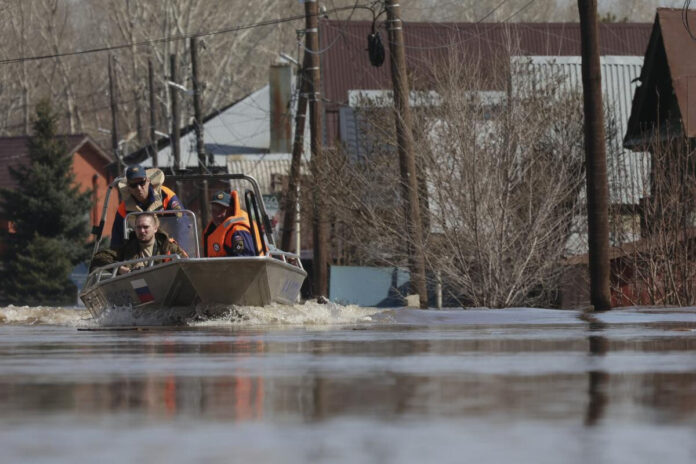Moscow, Apr 12
Nearly 12,000 houses have been flooded in a Russian region bordering Kazakhstan as water levels in the Ural River keep rising and threatening more deluge, authorities said on Thursday.
The floods sparked evacuations of thousands in the Orenburg region, located some 1,200 kilometers (745 miles), southeast of the capital of Moscow after a dam on the river burst last week under the pressure of surging waters. Local authorities have declared a state of emergency in the region.
In a televised videoconference with President Vladimir Putin, Orenburg governor Denis Pasler reported that a total of 11,972 houses are flooded, as well as 16 state medical facilities. Additionally, 3,600 houses — home to some 20,000 people — are in danger of imminent flooding as water levels continue to rise. The situation is most dire in the city of Orenburg, the administrative capital of the region, Pasler said, where the water level in the Ural River reached a historical peak of 10.87 metres (about 36 feet). A total of 7,800 people have been evacuated from the flooded areas so far, he added. The overall damage from the floods is estimated to exceed 40 billion rubles (USD 428 million). Further east along the Kazakhstan border, authorities in the regions of Kurgan and Tyumen are also preparing for possible floods as water levels rise in local rivers. Floods have also hit Kazakhstan, where authorities have declared a state of emergency in 10 out of 17 regions of the country, according to Russia’s state news agency Tass. As of Thursday, the state of emergency was still in place in eight regions, Tass reported. Since March, more than 98,000 people have been evacuated from the affected areas there.
Footage from the flooded regions in Kazakhstan showed water gushing down streets, vast fields covered with water and dozens of houses partially submerged. Kazakh President Kassym-Jomart Tokayev has called the floods “a natural disaster … the likes of which have not been seen for many years”.
“This is, perhaps, the biggest disaster in terms of its scale and consequences in over 80 years,” he said last week.
Home News International Nearly 12,000 homes flooded in Russian region bordering Kazakhstan as water levels...



























